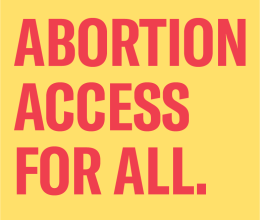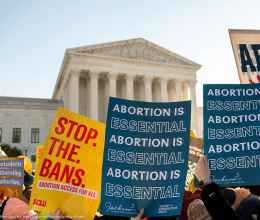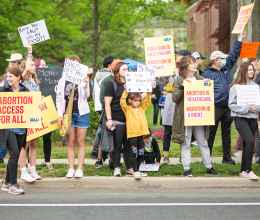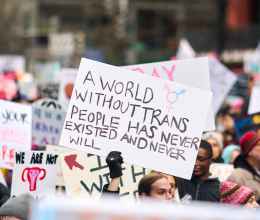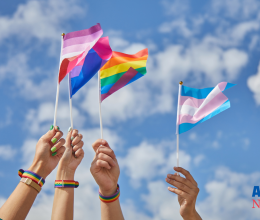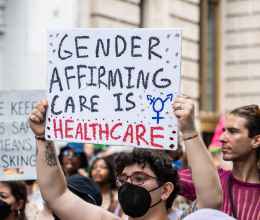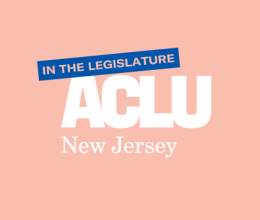Dr. Kristyn Brandi, a New Jersey OB/GYN, has always been passionate about social issues. When she decided to go to medical school, she figured she might have to put those inclinations aside to provide care. But, fortunately for her — and fortunately for reproductive freedom — that worry was unfounded.
Dr. Brandi is a voice for reproductive freedom, social justice, and LGBTQIA+ rights, both in New Jersey and around the country. She works in partnership with the ACLU-NJ as a member of the Thrive Coalition, which advocates for access to abortion for all in our state through legislation, the Reproductive Equity Act.
Dr. Brandi’s practice encompasses medical care across the spectrum of reproductive health, including abortion care, prenatal care, gynecologic procedures, and outpatient gynecologic care. That perspective, along with her roles as the Darney-Landy Fellow at the American College of Obstetricians and Gynecologists and board chair of Physicians for Reproductive Health, gives her deep knowledge and a nuanced perspective on all aspects of reproductive health and policy.
The ACLU-NJ spoke with Dr. Brandi about how the U.S. Supreme Court’s ruling in Dobbs v. Jackson Women’s Health Organization, which overturned Roe v. Wade and ended federal protection for abortion rights, has altered our country and state. We discussed a range of issues, like what might surprise people about abortion, why every New Jerseyan needs to take action to pass the Reproductive Equity Act, and other important topics in reproductive health.
Read the Q&A — and take action to urge legislators to pass the Reproductive Equity Act.
ACLU-NJ: Thank you for all of your work, Dr. Brandi, and for your long partnership with the ACLU-NJ in service of such an important cause. Why is protecting the right to abortion care so important?
Dr. Kristyn Brandi: Abortion care is a critical component of comprehensive reproductive health care. Just like I would not want medical treatment like prenatal care, contraception, or LGBTQIA+ care to be denied, I do not want abortion care to be stigmatized or for us to have laws that prevent people from receiving this absolutely essential healthcare.
Abortion care allows people to make fundamental choices about whether or not they want to be a parent or have more children.
ACLU-NJ: Coming from the perspective of an OB/GYN who practices across the scope of reproductive health, how do you view abortion care as a clinician?
Dr. Brandi: Abortion is critical, essential care for ending a pregnancy. Abortion is safe and effective — about 10 times safer than childbirth in terms of mortality. The longer a pregnancy continues, the higher the risk to the pregnant person, and that makes delays and prohibitions on abortion ethically and morally unconscionable. It can be traumatizing, and dangerous in some circumstances, for a patient to continue with a pregnancy against their will, as we’ve seen already in states where abortion was made illegal after the Dobbs decision.
Patients and doctors in emergency situations are forced to choose now between doing the right thing — providing care — versus delaying care until someone is "sick enough." This false choice wholly violates our oath as health care providers.
It is insulting that patients cannot exercise their reproductive autonomy and choose what is best for their own lives. And it is worrisome that we are seeing similar interference in other types of healthcare, such as gender-affirming care. It should be unacceptable for the government to decide what type of care is appropriate for people. But that is the situation for people in many different states, and I worry for them.
ACLU-NJ: You’ve been a physician since 2011. What kinds of circumstances have led your patients to receive abortion care?
Dr. Brandi: I've seen many patients for abortion care who came in with desired pregnancies, who had received prenatal care — but for various reasons it became clear to them that continuing with their pregnancy was not in their best interest. And that's okay — it’s much more than okay. It’s profoundly important. Just as it is okay — and just as monumentally important — for people in complex medical and social situations to continue a pregnancy when that’s right for their lives.
I’ve also seen patients who found out they were pregnant at a time when they could not imagine becoming a parent or knew that they could not add another child to their family. The relief in many patients is palpable when they know they have reclaimed a future that was temporarily imperiled.
Ultimately, it should be up to pregnant people to decide what the next step is. That’s something that every single one of my patients has in common. Each person I’ve treated is a big deal to me. They trust me with their care for something so personal, and so hugely important to their lives.

ACLU-NJ: For a huge swath of the country, people experiencing the same situations as the patients you’ve treated now find their autonomy ripped away. What does abortion care look like in the wake of the Dobbs ruling, both nationally and in New Jersey?
Dr. Brandi: Nationwide, we are in a dark time for abortion access and reproductive health care. Even before Dobbs, abortion restrictions were on the rise. Now, in a large number of states, abortion care is simply not attainable, or outright illegal.
In New Jersey, we’re a light in the darkness. But our lawmakers have a critical choice: is New Jersey going to be a flashlight, or will we shine out as a beacon? We need to do everything to demonstrate what full reproductive autonomy and access can look like.
ACLU-NJ: Where does New Jersey stand in terms of protection of abortion rights?
Dr. Brandi: I'm a proud New Jerseyan, and nothing has made me prouder than the strides New Jersey has made to improve abortion care in our state. A law was signed this year protecting the right to reproductive freedom, and new regulations have removed red tape that unnecessarily restricted abortions. New Jersey also expanded the range of skilled advanced practice clinicians who can provide abortion care, including nurse practitioners and midwives.
Yet a gaping hole remains: New Jersey desperately needs to ensure that all New Jerseyans have not just the right to abortion, but access.
ACLU-NJ: What role does access play in protecting our right to reproductive freedom and abortion care?
Dr. Brandi: People may not realize that even in states that have fewer restrictions, like New Jersey, barriers that prevent people from getting the care that they need can often be insurmountable. A bill currently before the Legislature, the Reproductive Equity Act, could go a long way to overcoming those barriers.
The Reproductive Equity Act (REA) makes sure that the right to reproductive freedom is a right that all New Jerseyans can access. Regardless of income, immigration status, or insurance, it would ensure abortion access for New Jerseyans without fees or out-of-pocket costs.
The REA strengthens access in several ways.
It requires all insurance providers, both private and public, to cover abortion in New Jersey with no out-of-pocket costs or co-pays for patients.
It creates a fund to make is possible for people who are uninsured, under-insured, or undocumented to receive abortion care.
It trains more providers so that we’re equipped to serve the increase in patients coming from out-of-state.
It provides facilities with support to increase security amid heightened threats from extremists.
ACLU-NJ: How have you seen these barriers affect marginalized communities in particular — especially people of color, members of the LGBTQ+ community, and immigrant New Jerseyans — in receiving abortion care?
Dr. Brandi: Just like many other types of health care, marginalized communities often have a harder time accessing care — and that's on a good day. Consider that anyone who makes an appointment potentially has to take time off from work, secure childcare, travel via car or public transportation, and either have health insurance or pay out-of-pocket. As a result of a history of systemic oppression, marginalized folks have less access to resources that make these things possible and thus less access to care. Then, let's move that provider 100 miles from where they are, potentially to the next state over — if they’re lucky enough to be near one without restrictions.
Those hurdles can become so strenuous that care is impossible to get. Abortion bans cause health care providers to move and clinics to close, which pushes care even farther away and makes it less accessible. This doesn't even touch on the fact that these communities, through systemic issues, also struggle to get other types of health care, especially primary care and prenatal care, and have worse health outcomes.

ACLU-NJ: In addition to hindrances like travel and affordability, people also unfortunately must contend with threats of violence. How does support for security help with access?
Dr. Brandi: The threats against providers and intimidation of patients are very real, sometimes with deadly consequences, such as the assassination of Dr. George Tiller while attending church. Crimes like arson and bombings directed toward abortion clinics, as well as violent threats, are on the rise. We do not want that happening anywhere.
In states that offer greater protections for abortion, like ours, we do not want patients who are already contending with systemic barriers to be discouraged by fear. Part of protecting access to abortion is making sure that threats of violence don’t interfere with each person’s individual autonomy and freedom. Providers need support to address those threats — for things like cameras, lighting, and other security measures — to protect their patients, staff, and communities.
ACLU-NJ: Dobbs poses new liabilities for abortion care and education, on top of the strains our health care system has borne from the pandemic. How can we make sure that we have enough providers to keep abortion care accessible?
Dr. Brandi: As other states restrict abortion, patients are coming to New Jersey in greater numbers to get the care they can't get elsewhere. We need more staff and providers to help continue this work, and that includes training. New Jersey took the important step of broadening the kinds of advanced practice clinicians who can provide abortion care, but many need training. The Reproductive Equity Act gives financial support in New Jersey toward this education, which will become increasingly important as these opportunities recede throughout the country.
ACLU-NJ: What are the most important actions people in New Jersey should be taking to protect abortion rights?
Dr. Brandi: Legislative action is the most critical way to protect the current care we have and to prevent things like a national abortion ban. The best thing you can do is contact your state elected officials and your national representatives and urge them to protect reproductive freedom. Call, email, tweet – we desperately need legislation like the Reproductive Equity Act.
Calling is most effective, because legislative offices log and tally calls on each issue. We need to flood their lines with people supporting abortion access. But they log emails, too.
We also need to support abortion access funds, like the New Jersey Abortion Access Fund, which can help patients afford care and navigate logistics. These services are vital, but in comparison to what’s needed at a state and federal level, they are a Band-Aid that was never meant to be a permanent solution.
ACLU-NJ: To close this conversation with a focus on what’s at stake: what does abortion mean to your patients personally?
Dr. Brandi: Abortion means so many things when you’re in need of one. It is freedom – freedom to decide what is best for you, your body, your family. It is love – for your current kids and family, for yourself. Sometimes it is happy and sometimes it is sad for the person seeking it. But it is always necessary for whoever needs it.
That direct experience with patients drives me in my advocacy. I’m naturally an introvert, but I can't be silent when my community is impacted. I see firsthand how a lack of abortion access shatters lives. I've been in the position of counseling someone, holding their hand, looking them in the eye, and telling them whether or not they can get the care they need. It is heartbreaking in situations where a legal or systemic barrier prevented a patient from getting necessary care.
I do this work with the sincere hope that the advocacy we do together and the care we deliver as providers can one day secure a future where no one surrenders their autonomy, their health, or their humanity when they determine the direction of their lives.

